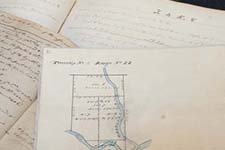Georgia Court Records – A Guide to Courthouse Research
Georgia Government records cover a broad range of genealogy subject areas that can help you as part of your research, such as land ownership, courts, taxes, and naturalization’s. Given that Georgia court records cover such a wide selection of topics, they could aid you in many different ways.
As an example, they could aid you in finding ancestors’ residences, identify occupations, locate financial information, determine citizenship status, or shed light on relationships between individuals. The whole thing relies upon on the type of court records that the ancestors” names show up in. For Definitions of all court terms see the Genealogy Encyclopedia.
Georgia Courthouse records change extensively from county to county in both level of quality and volume. You will find different kinds of court records that are most likely to possess information related for your genealogical research below.
Georgia Court Records

In 1798 inferior courts were established. They handled probate cases until 1852. They also handled misdemeanor cases and civil matters. In 1846 the Georgia state supreme court was established. The Georgia Archives holds the records and files from that court system. The Georgia Reports also features published decisions from that court and is published each year. The National Archives-Southeast Region holds all of the circuit court and federal district court records for Georgia except the ones from recent years.
The Georgia Archives holds asylum and prison records for the state of Georgia. After each of those records is at least 75 years old it is available for public research purposes.
A large collection of Georgia’s county court records is available at the FHL. Many can also be found at the U.S. Circuit Court, District of Georgia.
See Also Guide to U.S. Court Records Research
Georgia Land Records

Some of the most important records for Georgia are the tax digests, and the property and land records. The Georgia Archives has surviving state and colonial records of land grants. Many of them are original documents that have not been microfilmed. However, most of the surveys (plats) from before 1776 no longer exists. Neither do some of the last colonial land grants.
On February 17, 1783 a law was passed providing bounty-land and headright grants in Georgia. Each head of household was given 200 acres of land for free and could pay 1 to 4 shillings for each set of 50 additional acres, one of which could be purchased for each slave or other family member. However, each grant has a 1,000-acre limit. Grant and survey fees had to be paid by each grantee. Anyone who already occupied land at that time as a result of colonial grants from before Georgia gained statehood was allowed to keep their land.
The act that passed in 1783 also called for each county to have its own land court. However, most of the county land court records are no longer extant, except for those from Wilkes County. In order to obtain a warrant of a survey for a land grant, the applicant had to swear to five justices under oath that he was stating his family size and number of slaves accurately. After the applicant’s land was surveyed by the county surveyor, the surveyor general’s office was set a copy of the survey plat. The county kept the original document. Each applicant had to agree to cultivate at least 3% of their total land acreage and live on the land for a minimum of one year. Once the requirements were met, the applicant could pay the fees and apply for a grant. The grant would then be issued to the applicant and recorded. Counties where headright grants were awarded were: Bryan, Bullock, Burke, Camden, Chatham, Clarke, Columbia, Effingham, Elbert, Emanuel, Franklin, Glascock, Glynn, Greene, Hancock, Hart, Jackson, Jefferson, Johnson, Laurens, Liberty, Lincoln, Madison, McDuffie, McIntosh, Montgomery, Oconee, Oglethorpe, Richmond, Screven, Taliaferro, Tattnall, Warren, Washington, Wilkes
Soldiers who served in Georgia’s military were given bounty-land grants. From 1781 to 1782 come civilians were also given grants, along with those from Georgia who continued the war in other states, who were known as “refugees.” Abstracts exist for most Georgia bounty certificates from the Revolutionary War. However, civilian certificates have not been abstracted.
On February 25, 1784 another bounty land act was passed and land was given out in other counties. Those grants were given to veterans of the Navy and the Continental Line. Bounty-land grants from that act were mainly given out in what became Greene County later on.
Unlike other states, Georgia distributed bounty-land using a lottery system. The lands in the northern and western three-quarters of the present-day state were distributed using that system from 1805 to 1833. Lotteries were held in the following years: 1805, 1807, 1820, 1821, 1827, 1833
Two lotteries were held in 1832 as well. Every citizen of the state could participate in the lotteries. However, special consideration was given to veterans during the lotteries of 1820, 1827, and 1832. There are several published lottery books, which may help resources pinpoint the location of ancestors at the time when the lottery was held.
Deeds from times when lottery lots were resold can also be useful sources of information. Each county recorded those deeds for lands within that county. Each county’s superior court clerk recorded land transactions that were conducted between individuals privately.
Most land records from before 1900 that still exist today are at the FHL and at the Georgia Archives on microfilm. That may include land court records, as well as deeds. However, most of the individual courthouse plat books for each county have not been placed on microfilm. See Also Guide to U.S. Land Records Research
- BLM Land Records (glorecords.blm.gov)
- Land Grants to Georgia Revolutionary War Veterans The state of Georgia did nothing for its Revolutionary War veterans until 1820 when veterans were allowed to enter the Third Land Lottery of Georgia. Requirements for entering this lottery included residence in the state of Georgia for at least three years and service in the United States military during the Revolutionary War. This military service was not limited to service in or under the state of Georgia. Subsequently, Revolutionary War veterans were also allowed to enter the Fifth and Sixth Land Lotteries of 1827 and 1832, respectively, with the same requirements as in the Third Land Lottery. This database contains a list of all the veterans who won land in the Third, Fifth, and Sixth Land Lotteries of the state of Georgia. Along with the name of the veteran, the list also includes the name of the county in which the veteran resided as of the date indicated, Land Lottery, the year of the Lottery (1820, 1827, or 1832) in which the veteran won land, the Land Lot number, District number, occasionally the section number, and county of the draw (which are all indicated under the “Fortunate Draw” column), and the date the land was granted.
- Georgia Land Lottery, 1827 Georgia began in 1805 to offer land to its citizens through lotteries. These lotteries often serve as useful substitutes for the lost federal census returns for the early 1800s in the state. The 1827 lottery dispensed lots in Carroll, Coweta, Lee, Muscogee, and Troup counties. Search this database for thousands of Georgians who were “fortunate drawers” in this unique land dispersal.
- Georgia Cherokee Land Lottery, 1832 Of all the states, Georgia has the distinction of being the only one to distribute parcels of land by lottery. This database is a listing of persons allotted land in 1832 from what was considered “”Cherokee Land.”” Located in the northeastern part of the state, over 18,500 parcels were distributed by lottery in that year. Each record of this collection contains the individual’s name, residence, and county. Additionally, it provides the district and section number of the parcel of land. For researchers of early Georgian ancestors, this can be an enlightening database.
- Georgia Headright and Bounty Land Records, 1783-1909 (familysearch.org) Collection of individual documents from Georgia’s original land grant system, the headright and bounty system, 1783-1909. Bounty lands were awarded for service in the Revolutionary War. Headright law provided the head of a family with a grant of land. The records were filmed at the Georgia State Archives in Morrow. This collection is being published as images become available.
- Headright and Bounty Plats of Survey, 1783-1909 (sos.state.ga.us) This series consists of original plats of survey for headright and bounty land plats. They are the copies submitted to the Surveyor General to be recorded in plat books, the official record copy.
Beginning in 1783 a man living in Georgia could be granted 200 acres of land on his own head-right and fifty acres for each additional family member, including slaves, up to 1000 acres. To acquire a land grant an applicant would appear before the land court in the county in which he desired land to obtain a warrant of survey. The county surveyor then surveyed the land, made a plat of survey, and forwarded a copy of the plat to the Surveyor General to be recorded. The applicant then applied to the Governor’s office for the grant after he paid all office fees. The grant was then issued and recorded.
The headright and bounty plats depict a tract of land surveyed, including physical features and adjoining land owners. The document includes the name of the individual for whom the land was surveyed; the number of acres surveyed; the date the warrant was issued for the survey; the date of survey; and the names of the chain carriers and surveyor. Often the reverse of the plat includes the location of the recorded plat. - Georgia Land Record Books (amazon.com)
Georgia Probate Records

From 1777 to 1798 probate records in each county were kept by the ordinary courts. In 1852 they began keeping those records again. During the time in between, the records were kept by the inferior courts in each county.
Most of the county probate records from before 1900 for Georgia can be found on microfilm at the FHL and the Georgia Archives. There are also several original loose county records at the Georgia Archives. See Also Guide to U.S. Probate Records Research
- Colonial Will Books, 1754-1779 (state.ga.us) Wills recorded in the Royal Colony of Georgia. These records are from Record Group 049-01-005, Colony of Georgia – Will Books.
After Georgia became a royal colony in 1754, the governor acted as ordinary or appointed an official to carry out such duties. The ordinary probated wills, provided instructions to administrators for the inventory and appraisal of an estate, and ensured that administrators followed all legal requirements in settling the estate. These wills are the official record copy transcribed into volumes by the Ordinary. Each will includes: The name of the testator, Date and residence of the testator when the will was written, Bequests andAny instructions regarding the estate of the decedant
Most wills are accompanied by attestations of the will with the date the will was proved and/or the date the will was recorded. Some wills include codicils and letters of administration.
Each of these documents has several dates. The date indexed here is the date the will was proved, since this is likely to be closest to the date of the testator’s death. If the date proved is not evident, the date indexed is the date the will was recorded.
In addition to Colonial Will Books, the Georgia Archives has a series of Colonial Wills, Record Group 049-01-002, which are the loose copies submitted to the Ordinary for transcription into these volumes. RG 049-01-002 includes thirty-two wills from the Trustee period, 1733-1753, which are not recorded in these volumes. Researchers should search BOTH series for a comprehensive search of Georgia - Georgia Probate Record Books (amazon.com)
Georgia Tax Records

As of 1783 land in Georgia was taxed according to its quality and how much land the person in question owned. All white males over the age of 21 were polled for tax purposes. Other taxes had to be paid by free persons of color, or for slaves, improvements, buildings, and town lots. Lawyers, doctors, and merchandise were also taxable. The resulting tax digests led to the creation of multiple tax digests. Those records can substitute for missing census records, or supplement existing records.
The National Archives Southeast Region holds federal direct tax records for the years of 1865 to 1873 for Georgia. The 1865 and 1866 records have been microfilmed.
Legislative Activity for Taxes: 1817-1850
1818-1839: The acts during these years are all based on the tax act of 1817. These tax acts continually revive preceding acts, often with amendments. Many simple tax questions can be answered by a glance at the 1817 law. Complex or refined questions may require consulting the specific act for the year in question and then backward through a chain of revived acts.
1840: This act revives the Tax Act of 1804, with amendments. This was probably an attempt at simplification. The stated intention was to make this act permanent.
1842: This act increased the taxes of 1840 by 25%.
1843-50: The final years of the first half of the nineteenth century the Georgia Legislature re-enacted the 1840 act, which itself was a revival of the 1804 act. The 1847 act did require that taxes be paid in the county in which the land was held in jurisdiction. Previously, the tax had been paid in the county of residence. See Also Guide to U.S. Tax Records Research
List of Tax Acts of Georgia from 1780-1817
|
|
|
|
- County Tax Digests (state.ga.us) County Tax Digests are records scanned from microfilm in the Georgia Archives. The digital collection currently includes eighteenth century tax records. County Tax Digests are records scanned from microfilm in the Georgia Archives
- Georgia Tax Index, 1789-1799 Before this century, taxation was often based on property ownership. As a result of this, and other cultural constraints, most of those taxed were male landowners. This database reflects some of these realities in late 18th Century Georgia. Listing over 11,500 persons, this database is an index of tax records held by the state government. It reveals the name of the taxpayer, county and district of residence, and year of the taxation record. For those seeking ancestors from Georgia, this database can be a source of valuable information.
- Some early tax digests of Georgia
- Georgia, Property Tax Digests, 1890 This database contains tax digest books for 137 Georgia counties from 1793 – 1892, making the collection a possible census substitute. The books list names of taxpayers and assessments of value for various types of property and assets, as well as indicating who owed the poll tax. As such, the records should include all men 21 and over and women who owned property. Another important feature of the digests is their inclusion of African-American freemen by name.
- Georgia Tax Record Books (amazon.com)
Georgia Immigration & Naturalization Records

The North Carolina Genealogical Society Journal and the Virginia Genealogist periodical each published many British merchant claims. Those publications show migration patterns for families in the state prior to 1810. Before 1820 passports of good character were issued by Georgia governors for any families who were headed west and had to pass through Indian lands to get where they were going. See Also Guide to U.S. Immigration Records Research
